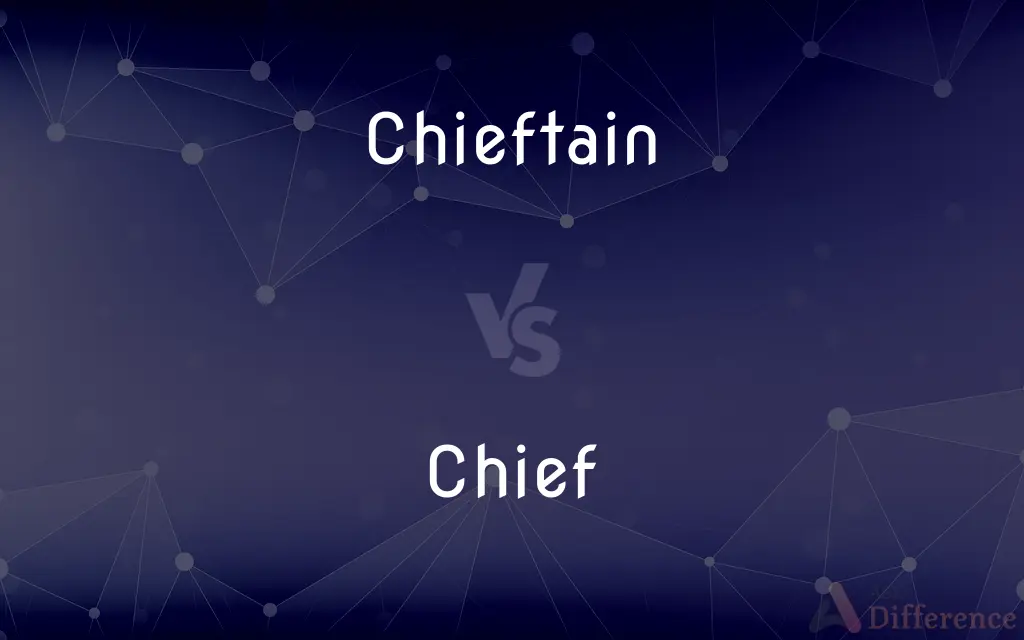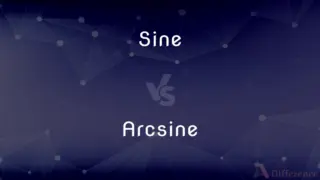Chieftain vs. Chief — What's the Difference?
By Maham Liaqat & Urooj Arif — Updated on March 11, 2024
A chieftain is a leader of a tribe or clan, while a chief is a high-ranking leader or authority figure in various contexts.

Difference Between Chieftain and Chief
Table of Contents
ADVERTISEMENT
Key Differences
Chieftains typically hold authority within tribal or clan structures, often inheriting their position through lineage or being elected by members of the group. They are integral to the social and cultural fabric of their communities, leading in matters of tradition, conflict resolution, and the welfare of their people. On the other hand, a chief can hold a leadership role in diverse contexts, ranging from corporate environments as a Chief Executive Officer (CEO) to governmental or military positions such as a police chief or chief of staff.
The role of a chieftain is deeply rooted in the history and traditions of the group they lead, with their authority often recognized through ceremonial symbols and rituals. Chiefs, however, are recognized through formal titles and roles within organizational structures, and their authority is usually defined by specific duties and responsibilities outlined in official documents or job descriptions.
While chieftains are primarily associated with leadership within small, often rural communities with a strong emphasis on kinship and tradition, chiefs can lead large, complex organizations or entities, such as corporations, government departments, or military units. This reflects the broader and more varied application of the term "chief."
The selection or appointment of a chieftain often involves traditional processes, including inheritance or community consensus, emphasizing the chieftain's personal connection to the group's history and culture. In contrast, chiefs are typically appointed or elected based on formal qualifications, experience, and the requirements of the role, highlighting the professional rather than personal nature of their leadership.
Chieftains play a crucial role in preserving the cultural heritage and traditions of their communities, often acting as custodians of customs, language, and history. Chiefs, while they may also be influential in cultural or organizational traditions, are more focused on the strategic direction, administration, and operational effectiveness of the entities they lead.
ADVERTISEMENT
Comparison Chart
Scope
Tribal or clan leadership
High-ranking leadership in various contexts
Authority Origin
Lineage, election by tribe or clan
Formal appointment or election in organizations
Context
Tribal societies, traditional communities
Corporations, government, military, etc.
Role Emphasis
Cultural leadership, community welfare
Strategic direction, administration
Selection Process
Inheritance, community consensus
Qualifications, experience, formal election
Compare with Definitions
Chieftain
A chieftain is often the leader of a tribe or clan, playing a central role in governance and cultural practices.
The chieftain led the ceremony, wearing traditional regalia.
Chief
A chief is a high-ranking leader or authority figure, overseeing operations and making strategic decisions.
The chief of police announced new community safety measures.
Chieftain
In many cultures, the position of chieftain is hereditary, passed down through generations.
As the eldest son, he was next in line to become the chieftain.
Chief
Chiefs exist in various contexts, from corporate to governmental, embodying leadership and responsibility.
The chief executive officer outlined the company's new strategy.
Chieftain
Chieftains are deeply involved in the life of their community, often acting as mediators and protectors.
The chieftain resolved the dispute between the two families.
Chief
Chiefs are responsible for setting strategic directions and ensuring operational effectiveness.
The chief financial officer presented the annual budget plan.
Chieftain
Chieftains play a key role in preserving and passing down traditions and customs.
The chieftain taught the young members the ancient dances of their tribe.
Chief
Chiefs are typically appointed based on qualifications and experience, reflecting the professional nature of their roles.
She was appointed chief marketing officer due to her extensive experience.
Chieftain
Chieftains are integral to the governance structure of tribal societies, embodying the authority and unity of the group.
The chieftain convened the council to discuss the upcoming harvest.
Chief
Chiefs hold formal positions, defined by official duties and responsibilities.
The fire chief coordinated the emergency response teams.
Chieftain
The leader or head of a group, especially of a clan or tribe.
Chief
A leader or ruler of a people or clan
Chief Banawi
The chief of the village
Chieftain
A leader of a clan or tribe.
Chief
An ordinary consisting of a broad horizontal band across the top of the shield.
Chieftain
(by extension) A leader of a group.
The robber chieftain divided up the spoils.
Chief
Most important
Chief among her concerns is working alone at night
The chief reason for the spending cuts
Chieftain
A captain, leader, or commander; a chief; the head of a troop, army, or clan.
Chief
One who is highest in rank or authority; a leader.
Chieftain
The leader of a group of people;
A captain of industry
Chief
A chief petty officer.
Chieftain
The head of a tribe or clan
Chief
(Nautical) The chief engineer of a ship.
Chief
(Slang) A supervisor; a boss.
Chief
(Heraldry) The upper section of a shield.
Chief
Highest in rank, authority, or office
The chief scientist in the lab.
Chief
Most important or influential
The chief ingredients in the stew. See Usage Note at absolute.
Chief
A leader or head of a group of people, organisation, etc.
All firefighters report to the fire chief.
Chief
(heraldry) The top part of a shield or escutcheon; more specifically, an ordinary consisting of the upper part of the field cut off by a horizontal line, generally occupying the top third.
Chief
The principal part or top of anything.
Chief
An informal term of address.
Chief
An informal term of address for a Native American or First Nations man.
Chief
Primary; principal.
Negligence was the chief cause of the disaster.
Chief
(Scotland) Intimate, friendly.
Chief
To smoke cannabis.
Chief
The head or leader of any body of men; a commander, as of an army; a head man, as of a tribe, clan, or family; a person in authority who directs the work of others; the principal actor or agent.
Chief
The principal part; the most valuable portion.
The chief of the things which should be utterly destroyed.
Chief
The upper third part of the field. It is supposed to be composed of the dexter, sinister, and middle chiefs.
Chief
Highest in office or rank; principal; head.
Chief
Principal or most eminent in any quality or action; most distinguished; having most influence; taking the lead; most important; as, the chief topic of conversation; the chief interest of man.
Chief
Very intimate, near, or close.
A whisperer separateth chief friends.
Chief
A person who is in charge;
The head of the whole operation
Chief
A person who exercises control over workers;
If you want to leave early you have to ask the foreman
Chief
Most important element;
The chief aim of living
The main doors were of solid glass
The principal rivers of America
The principal example
Policemen were primary targets
Common Curiosities
How does a chieftain's authority differ from a chief's?
A chieftain's authority is often rooted in traditional and communal consensus, whereas a chief's authority is defined by formal roles and responsibilities in organizational structures.
Is the position of chieftain always inherited?
While many chieftain positions are hereditary, some are elected by members of the tribe or clan, depending on the community's traditions.
How is a chieftain chosen in tribal societies?
The selection process can vary, involving inheritance, community consensus, or election, reflecting the tribe or clan's customs and traditions.
Can a chief be part of a tribal society?
While the term "chief" can be used in tribal contexts, it generally carries a broader application across different organizational and societal structures.
What defines a chieftain?
A chieftain is the leader of a tribe or clan, often holding the position through lineage or community election, and plays a central role in cultural and community affairs.
Can someone be both a chieftain and a chief?
It's possible for someone to hold both titles in different capacities, such as leading a tribal community as a chieftain and holding a formal leadership role as a chief in another context.
What responsibilities do chiefs have in corporations?
In corporations, chiefs such as CEOs or CFOs are responsible for strategic planning, financial management, and overall organizational leadership.
How does the community view chieftains?
Chieftains are often revered and respected figures in their communities, seen as custodians of culture and leaders in community affairs.
How do chieftains and chiefs resolve conflicts?
Chieftains often use traditional methods and community consensus to resolve conflicts, while chiefs may rely on formal procedures and organizational policies.
What is the role of a chief?
A chief is a high-ranking leader or authority in various contexts, responsible for strategic direction, administration, and operational effectiveness within an organization or entity.
What types of organizations have chiefs?
Corporations, government departments, military units, and emergency services are examples of organizations that have chiefs in various capacities.
What qualifications do chiefs typically need?
Chiefs are usually required to have relevant qualifications, experience, and skills appropriate to the specific role and industry they are in.
How do the roles of chieftains and chiefs evolve over time?
Both roles evolve in response to changes in society, culture, and organizational needs, with chieftains adapting to modernity while preserving traditions and chiefs responding to evolving business and societal demands.
Do chieftains have a role in modern society?
Chieftains continue to play significant roles in many cultures, particularly in maintaining traditions, community welfare, and governance in tribal and clan-based societies.
What challenges do chiefs face in modern organizations?
Chiefs in modern organizations face challenges such as navigating complex business environments, leading diverse teams, and responding to rapid technological changes.
Share Your Discovery

Previous Comparison
Commercial vs. Retail
Next Comparison
Sine vs. ArcsineAuthor Spotlight
Written by
Maham LiaqatCo-written by
Urooj ArifUrooj is a skilled content writer at Ask Difference, known for her exceptional ability to simplify complex topics into engaging and informative content. With a passion for research and a flair for clear, concise writing, she consistently delivers articles that resonate with our diverse audience.














































